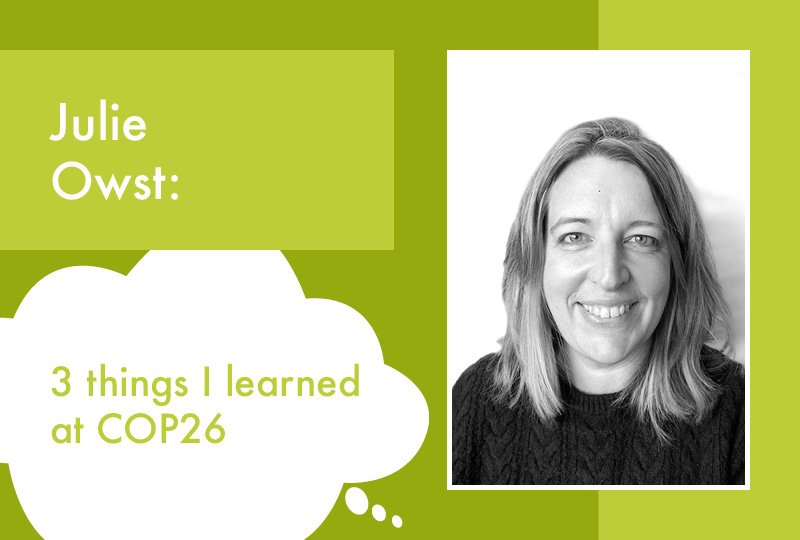These have ranged from Joe Biden’s 21-strong motorcade, David Attenborough’s powerful speech, the global protests that have spilled out onto the streets across the globe and, crucially, the host of commitments being made to focus efforts on keeping the planet habitable and healthy.
It’s been a full-on agenda with an overwhelming amount to take in, and so much controversy as well as differing opinions on the same issues, but I’ve tried to distil all the debate down into three key takeaways that mean the most to me:
Green wash won’t wash
Businesses of all shapes and sizes are keen to play their part by battling against climate change, and hitting zero emissions. In fact, 60% of the UK’s FTSE 100 companies have joined the Race to Zero campaign and signed up to go net zero by 2050 at the latest.
But to make sure best intentions and commitments are grounded in real action, the UK Government has announced that UK firms and financial institutions will have to publish tangible, detailed transition plans from 2023, outlining how they intend to align with the UK’s 2050 net zero target by setting out targets and the steps they are taking.
At Bidfood, we have long believed that robust measurement is vital in any CSR strategy. This is why, for example, we externally verify and assure all the facts we quote in our sustainability report, and we have committed to a science-based zero carbon target which will require rigorous measurement and reporting.
However, not every business takes this approach, and many businesses measure progress and targets in very different ways. Plus, there are so many SME businesses that have great intentions, but don’t know where to start, or how to make the biggest impact on their emissions.
It will be a massive undertaking to harness the enthusiasm of the corporate sector and get businesses pulling in the same direction to achieve measureable progress.
Whilst some of the biggest corporations in the world are collaborating to create huge, combined investment funds to address climate change, it will also take a lot of effort, advice and investment to help the 99% of total businesses in the UK that are SMEs who need much more help to get their own plans off the ground.
So for me, it’s about getting involved and working together across industries to share best practice, our progress and to try and measure things as far as we can in the same way.
An example of this for our sector is the Zero Carbon Forum’s Roadmap to Net Zero, designed to help SMEs across hospitality and Foodservice: https://zerocarbonforum.com/assets/pdf/final-ZCF-roadmap.pdf
How can transport emissions be tackled?
Day 10 at COP26 was Transport Day, dealing with the challenge of how we phase out fossil-based fuel and vehicles. Road transport is the fastest rising emission globally, accounting for around a quarter of all global emissions. Transport is typically responsible for a significant proportion of the carbon footprint of food.
So what hope do we have of reducing the emissions caused by food transportation? Well to-date, the lack of innovation, availability of charging points and distance limitations that have hampered progress towards zero emission vehicles.
But this week, hot off the press, the UK government have made a landmark pledge to accelerate transport decarbonisation. They’ve committed that all new HGV vehicles in the UK will be zero emission by 2040, and that they will phase out new, non-zero emission heavy goods vehicles weighing 26 tonnes and under by 2035.
In addition to the existing commitment to phase out all new petrol and diesel cars and vans by 2030, there are plans to put in place a new design for electric vehicle charge points which will be installed across the UK. There’s international collaboration too that’s starting to happen, and 30 other countries have agreed to work together along similar lines.
This is good news, right?
But it will require a huge amount of investment by both governments and business to make it happen. There is an upside though- when vehicles need to charge, there will also be the opportunity to serve waiting drivers with food and drink, so the transition could well provide a welcome boost for the now bruised and battered hospitality sector…
Education, education, education
Day 6 of COP26 really resonated with me for many reasons, not least because of the inspiration I have always drawn from coming into contact with like-minded people at home, at work and as a parent.
The focus of this day was about the crucial role that youth and public empowerment has to play- we can’t leave it to governments and businesses to do the heavy lifting, we all need to play our part as individuals.
I’ve always been humbled by the attitude and passion of our people to get involved in sustainability. And as businesses, we need to harness that passion and make sure we educate every employee so that everyone knows how they can make that vital difference.
That’s not least because our own commitment to becoming Net Zero by 2045 will depend our own teams (those working with us today and those who have yet to join us in the future) delivering their part of those plans.
So I, for one, will be taking inspiration from this and making sure that education and engagement continue to be a central part of our Sustainability strategy- not only in what our plans are and the role our people can play, but also in how they can make a difference by reducing emissions in their own lives.
For me the two go hand in hand: we have the opportunity to engage them in our own net zero plans, and to help them reduce the emissions they may create in their own households. If an average UK citizen creates 13 tonnes of CO2e per year* , with a staff of over 4,000, that’s the opportunity to have an impact on a further 50,000 tonnes of carbon!
So how do I feel about how COP26 climate talks have gone so far?
Well you have to have hope, don’t you?
Despite the obvious point that the world hasn’t made anywhere near the progress needed, and we all have to work much harder and faster to avert disaster, there have been some really positive moves that do give me cause for some optimism.
Let’s hope that governments, businesses and people all make the most of this historical opportunity to change gear!
*Carbon Independent.org



